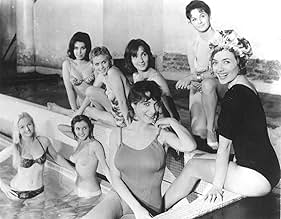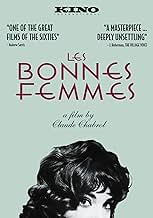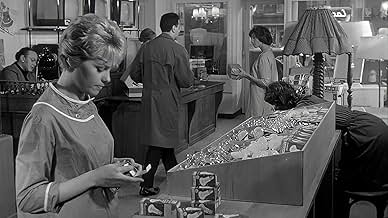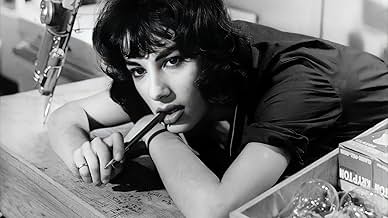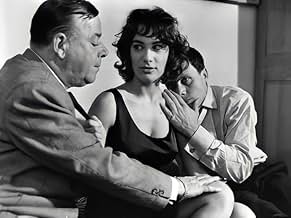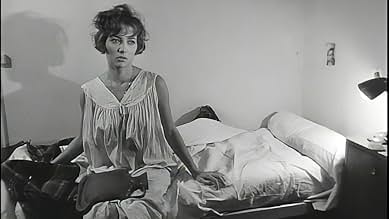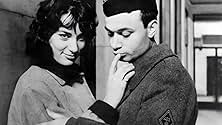NOTE IMDb
7,2/10
3,3 k
MA NOTE
Ajouter une intrigue dans votre langueFour Parisian women navigate the world of romance and daily life looking to fulfill their dreams but often find real-life to be inescapable.Four Parisian women navigate the world of romance and daily life looking to fulfill their dreams but often find real-life to be inescapable.Four Parisian women navigate the world of romance and daily life looking to fulfill their dreams but often find real-life to be inescapable.
- Récompenses
- 1 nomination au total
Gabriel Gobin
- Le père d'Henri
- (as Gabriel Gobain)
Histoire
Le saviez-vous
- AnecdotesCaused so much resentment among the public upon its release that some went as far as breaking seats in theaters as sign of protest.
- GaffesAfter Ernest strangles Jacqueline, he rips his coat out from under her and flips her over. The supposedly dead Jacqueline immediately moves her arm to catch herself from going face first into the mud.
- Citations
Monsieur Belin: My pleasure in life is to reprimand little girls... It's my prerogative.
- ConnexionsFeatured in Le fils de Gascogne (1995)
Commentaire à la une
Claude Chabrol made a film before Les bonnes femmes, Les Cousins, which is what made him known as part of the French New Wave (he preceded Truffaut and Godard by a year). But viewing Les bonnes femmes before seeing Les Cousins, I almost feel like this is a director's first film, for a director like Chabrol, as it shows a lot of his concerns as a filmmaker: an observational stance with women, their sexuality and their distance from the opposite sex, the mundane in a bourgeois life, and the Hitchcock angle of danger and the unknown. It's also in line with the other Nouvelle Vague films in the sense that the filmmaker has broken out of any ties to a studio or sets, and everything is out in the streets or on location in places like nightclubs and music halls and swimming pools, and usually with hand-held cameras and (seeming) improvisation with the actors. This is a gritty, on-the-streets Chabrol one isn't used to from seeing films like This Man Must Die and The Butcher.
And yet I don't know if I can say it's as great as the big early films of the period like The 400 Blows and Breathless. Chabrol's film does carry, I'm sure, some personal weight. And he's interested in these girls, their casual life and goings-on, and how so easily one of them can be lured by a mysterious man in a mustache who follows them around in a motorcycle. But it's such a loosely structured film- barely a plot, even less, if you can imagine, than Breathless- that it takes a moment for us to realize something is going on. Which perhaps is part of Chabrol's angle here: like Fellini's film I Vitelloni, we're just watching these four girls in their everyday occurrences, going to a zoo, going to a nightclub and hooking up with two (obnoxious) strangers, going to a music gall where one of the girls is secretly singing and doesn't want to go on for fear of embarrassment of the others seeing her, and just walking around. Or, as well, the complacency of working at a TV store where no one comes in.
We are drawn in to these girls and who they are, however limited they're really shown as full characters (more-so Chabrol is interested, I think, in these girls as 'types' possibly, or in looking at them in a semi-documentary perspective). And metaphor is used from time to time; I'm sure the visit to the zoo, and Chabrol's carefully timed and composed reaction shots of the animals in the cages, is deliberate as to the girls' own self-prison of 20-something frivolity. And there's also the matter, again, of the motorcycle guy, who somehow charms this girl. Actually not somehow, as in this sort of Nouvelle Vague film-world it's precisely the kind of guy a girl would fall for, even one seemingly so uptight as the one he goes after. Seeing how this plays out between them can go one of two ways, and how Chabrol shows it in the last fifteen minutes is totally masterful. There's a sense of the inevitable, but he keeps us uncertain as an audience, which is good. I'm glad I couldn't quite see where the ending would go, though when it came it made sense and was satisfying (it even raised up the worth of the film overall a full notch).
But a masterpiece? Probably not. It's like a breezy fling through a Parisian quarter, on the dark streets and cool nights with beautiful girls and not-so-beautiful but flirty men, and it has some wonderful moments. It just doesn't add up completely into something that makes you want to shake your friend up and say "You MUST watch this!" like 400 Blows, or even The Butcher.
And yet I don't know if I can say it's as great as the big early films of the period like The 400 Blows and Breathless. Chabrol's film does carry, I'm sure, some personal weight. And he's interested in these girls, their casual life and goings-on, and how so easily one of them can be lured by a mysterious man in a mustache who follows them around in a motorcycle. But it's such a loosely structured film- barely a plot, even less, if you can imagine, than Breathless- that it takes a moment for us to realize something is going on. Which perhaps is part of Chabrol's angle here: like Fellini's film I Vitelloni, we're just watching these four girls in their everyday occurrences, going to a zoo, going to a nightclub and hooking up with two (obnoxious) strangers, going to a music gall where one of the girls is secretly singing and doesn't want to go on for fear of embarrassment of the others seeing her, and just walking around. Or, as well, the complacency of working at a TV store where no one comes in.
We are drawn in to these girls and who they are, however limited they're really shown as full characters (more-so Chabrol is interested, I think, in these girls as 'types' possibly, or in looking at them in a semi-documentary perspective). And metaphor is used from time to time; I'm sure the visit to the zoo, and Chabrol's carefully timed and composed reaction shots of the animals in the cages, is deliberate as to the girls' own self-prison of 20-something frivolity. And there's also the matter, again, of the motorcycle guy, who somehow charms this girl. Actually not somehow, as in this sort of Nouvelle Vague film-world it's precisely the kind of guy a girl would fall for, even one seemingly so uptight as the one he goes after. Seeing how this plays out between them can go one of two ways, and how Chabrol shows it in the last fifteen minutes is totally masterful. There's a sense of the inevitable, but he keeps us uncertain as an audience, which is good. I'm glad I couldn't quite see where the ending would go, though when it came it made sense and was satisfying (it even raised up the worth of the film overall a full notch).
But a masterpiece? Probably not. It's like a breezy fling through a Parisian quarter, on the dark streets and cool nights with beautiful girls and not-so-beautiful but flirty men, and it has some wonderful moments. It just doesn't add up completely into something that makes you want to shake your friend up and say "You MUST watch this!" like 400 Blows, or even The Butcher.
- Quinoa1984
- 26 févr. 2010
- Permalien
Meilleurs choix
Connectez-vous pour évaluer et suivre la liste de favoris afin de recevoir des recommandations personnalisées
- How long is Les bonnes femmes?Alimenté par Alexa
Détails
Box-office
- Montant brut aux États-Unis et au Canada
- 6 578 $US
- Week-end de sortie aux États-Unis et au Canada
- 6 578 $US
- 15 août 1999
- Durée1 heure 40 minutes
- Couleur
- Rapport de forme
- 1.66 : 1
Contribuer à cette page
Suggérer une modification ou ajouter du contenu manquant

Lacune principale
By what name was Les bonnes femmes (1960) officially released in India in English?
Répondre
